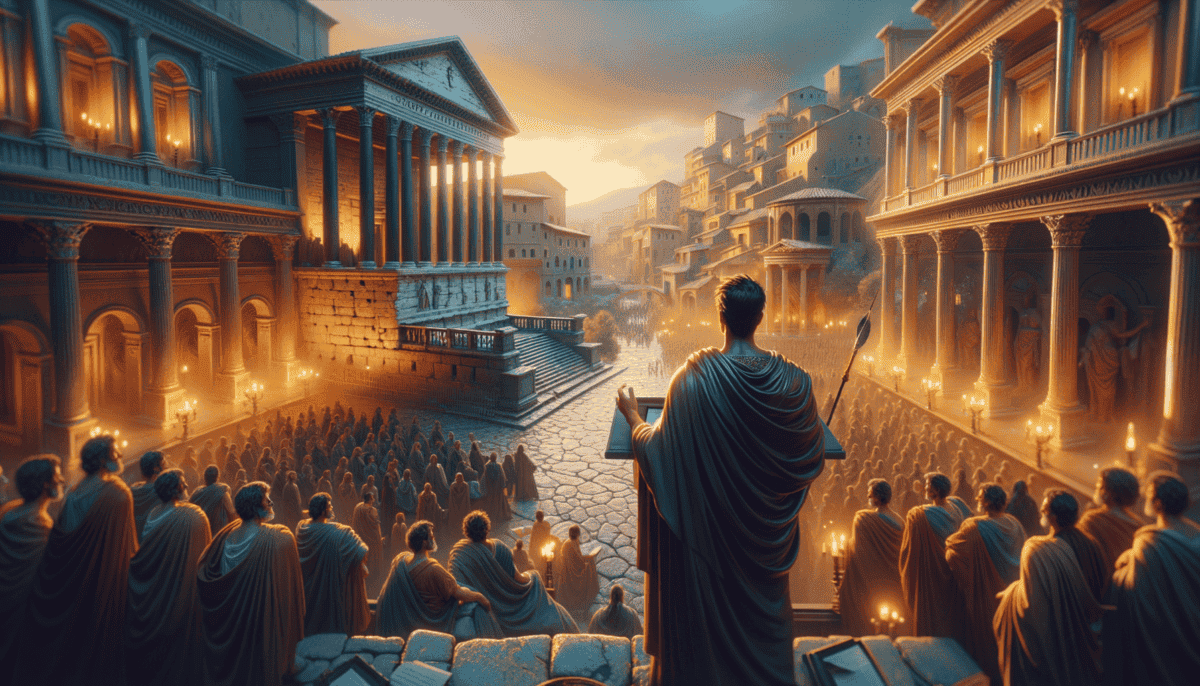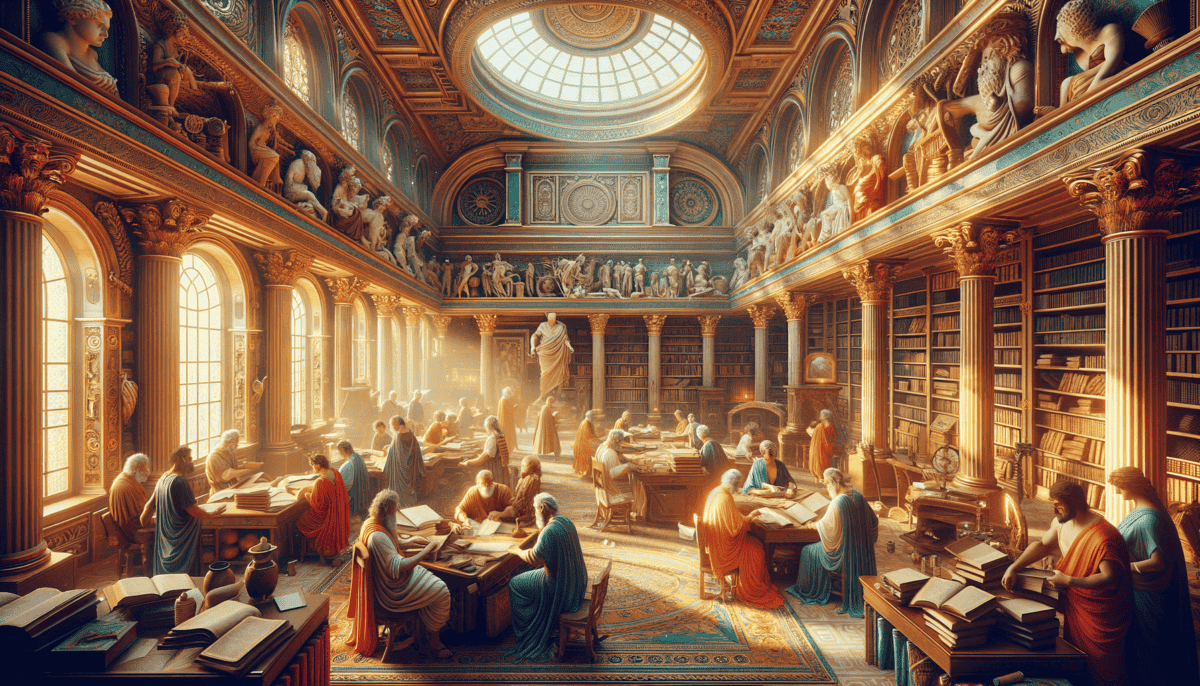Seeds of Storytelling
In a city of tall buildings and busy streets, a young boy named Marcus sat under an olive tree. He held a wax tablet and a stylus, tools that Roman children used to write. The warm sun peeked through the leaves as he watched people hurry past in their togas.
"What are you writing, Marcus?" asked his friend Julia, skipping over to join him.
"I want to tell stories like the great writers!" Marcus smiled, showing her his tablet covered in wobbly letters.
Long ago in Rome, before there were books or computers, people shared stories by speaking them out loud. They would gather in the Forum – a big open space in the middle of the city – to hear tales of brave heroes and mighty gods.
Two special boys lived in Rome during this time. Their names were Virgil and Cicero. They loved listening to the storytellers in the Forum.
Little Virgil lived on a farm outside the city. He would sit in the fields and make up poems about the birds, trees, and sheep. His father was proud of how well he could write, even as a child.
"Father, why do birds sing such pretty songs?" young Virgil asked one day.
"Perhaps they're telling stories too, my son," his father replied with a gentle smile.
Meanwhile, in another part of Rome, young Cicero spent hours practicing his speaking voice. He would stand in his family's garden, talking to the flowers and trees.
The city of Rome was changing too. New ideas were coming from far-away places like Greece. Writers started putting their stories on scrolls made of papyrus – a special paper from Egypt.
“Stories are like seeds,” Marcus’s teacher told him. “Plant them in someone’s mind, and they grow into beautiful thoughts.”
Just like Marcus and Julia under the olive tree, many Roman children dreamed of becoming writers. They learned by copying famous poems and speeches. Some wrote on wax tablets that could be smoothed out and used again. Others practiced speaking in front of their families.
The Magic of Words
Every morning, the streets of Rome filled with sounds:
• Market sellers shouting about their goods
• Teachers reading poems to their students
• Storytellers sharing tales in the Forum
• Children practicing their letters
• Writers reading their works to friends
The sun was setting now, and Marcus had filled his tablet with stories. Julia helped him smooth out the wax for tomorrow's writing.
"Do you think our stories will last forever?" Julia asked.
Marcus looked at the golden sky. "If we tell them well enough, maybe they will."
The first stars appeared above Rome's seven hills. Somewhere in the city, young Virgil was dreaming of epic poems, and little Cicero was practicing his speeches. They didn't know it yet, but their words would echo through time, inspiring writers for thousands of years to come.
A City of Stories
As night fell, lamplights flickered in windows across Rome. In homes throughout the city, parents told their children bedtime stories – tales of brave heroes, clever thinkers, and magical transformations.
These stories weren't just for fun. They taught important lessons about being brave, honest, and wise. The Romans believed that good stories could make people better.
Marcus tucked his wax tablet safely away. Tomorrow would bring new stories, new words, and new adventures in the greatest city in the world. The seeds of storytelling were growing stronger every day in ancient Rome, ready to bloom into something amazing.
The Rise of a Great Poet
Young Virgil sat under a shady tree on his family’s farm, watching fluffy sheep graze in the green fields. He held a small scroll in his hands, practicing his letters.
“Mother!” he called out excitedly. “Listen to this poem I wrote about our sheep!”
His mother smiled as she listened to his wobbly verses. “You have a gift with words, my son. But becoming a writer takes hard work.”
And work hard he did! Every day, young Virgil would:
- Practice writing on wax tablets
- Read poems from Greece
- Make up stories about farm animals
- Learn from traveling teachers
- Share his poems with friends
The Big City Adventure
When Virgil grew older, his parents sent him to Rome to study. The big city was very different from his quiet farm! ️
“Everything is so loud!” Virgil told his new friend Marcus. “And everyone wears fancy togas!”
“But think of all the stories waiting to be told here,” Marcus replied with a grin.
A Special Project
One day, Emperor Augustus heard about Virgil’s wonderful poems. He had a special job for the writer.
“Will you write a story about how Rome began?” the emperor asked. “Make it exciting and full of adventure!”
So began Virgil’s biggest project – a poem called the “Aeneid.” It told the tale of a brave hero named Aeneas who helped build Rome.
Working Hard
Writing the “Aeneid” wasn’t easy. Virgil worked on it for many years. Sometimes he would write all day and all night!
“Why do you work so hard?” his friends asked.
“Because every word must be perfect,” Virgil answered. “This story will help people understand where Rome came from.”
Virgil’s Writing Tips:
Write a little bit every day
Read your words out loud
Keep trying even when it’s hard
Listen to other people’s stories
Never give up on your dreams
A New Friend
Emperor Augustus often visited Virgil to hear parts of the story. They became good friends.
“Your words make Rome’s history come alive,” Augustus told him. “Children will read this story for years to come.”
The emperor was right! Even today, children still read Virgil’s poems and learn about the brave hero Aeneas.
Sharing the Story
Virgil’s fame grew bigger than the seven hills of Rome. People would stop in the street when they saw him coming.
“There goes Virgil!” they would whisper. “The man who writes about heroes!”
But Virgil stayed humble. He remembered his days as a farm boy, making up poems about sheep. He knew that every great writer starts with simple dreams.
As the sun set over Rome, Virgil looked at his writing scrolls. The little farm boy who loved words had grown up to be one of Rome’s greatest poets. His stories would travel far beyond the city walls, inspiring readers for thousands of years.
Dreams and Transformations
The morning sun sparkled on Rome’s marble buildings as young Ovid hurried through the busy streets. Unlike Virgil, he wasn’t a quiet farm boy – he loved the city’s excitement!
“Father wants me to be a lawyer,” Ovid told his friend Claudia. “But all I want to do is write stories about magic and changes!”
Stories Come Alive
Instead of studying laws, Ovid spent his time writing about amazing things:
- People turning into trees
- Gods becoming animals
- Heroes having magical adventures
- Stars dancing in the sky
- Love stories with happy and sad endings
“Your stories are different from other writers,” Claudia said. “They’re full of magic!”
“That’s because the world is full of changes,” Ovid replied with a twinkle in his eye. “Everything can transform into something new!”
The Big Book of Changes
Ovid worked on a special book called “Metamorphoses.” It was filled with stories about things changing into other things.
The children gasped and clapped. They loved how Ovid made impossible things seem real!
Getting in Trouble
But not everyone liked Ovid’s stories. Emperor Augustus thought some of them were too silly or naughty.
“Your poems are giving people bad ideas,” the emperor said angrily.
Ovid’s Trouble:
The emperor was mad at Ovid
He sent him far away from Rome
Ovid had to live by the Black Sea
He missed his home and friends
But he never stopped writing
Writing from Far Away
Even though he was sad about leaving Rome, Ovid kept writing. He sent letters and poems back to his friends.
“The weather is cold here,” he wrote. “But my stories keep me warm. They help me remember the sunny days in Rome.”
A Different Kind of Hero
Unlike Virgil who wrote about brave warriors, Ovid wrote about regular people who found magic in everyday life.
“Why do you write such different stories?” someone once asked him.
“Because life isn’t just about battles and heroes,” Ovid answered. “It’s about how people change and grow, like flowers blooming in spring.”
Stories That Last Forever
Even though Ovid never saw Rome again, his stories traveled everywhere. People loved reading about his magical changes and transformations.
Today, we still read Ovid’s tales about people turning into flowers, stars, and animals. His stories remind us that change can be beautiful and that magic is everywhere – if we know where to look!
As the stars twinkled over the Black Sea, Ovid smiled. He might be far from home, but his imagination could still fly free, creating wonderful stories that would change hearts and minds forever.
The Power of Words
Cicero stood in front of his mirror, practicing his speech. His voice echoed through his small room in Rome. ️
“Words are like magic,” he told himself. “They can change people’s minds and hearts.”
Learning to Speak Up
“Young man,” his teacher said one day, “you have a gift for speaking. But you must also be brave to use it.”
Cicero nodded. He knew that in Rome, speaking up could be dangerous. But he wanted to make things better for everyone.
“A good speaker must also be a good person,” Cicero wrote in his diary. “Words should help people, not hurt them.”
Fighting for Justice
Here are the ways Cicero used his voice to help others:
- Defending innocent people in court
- Speaking up against bad leaders
- Writing books about being good
- Teaching others how to speak well
- Standing up for what was right
Dangerous Times
One day, Cicero discovered some bad men who wanted to hurt Rome.
His words worked like magic. The people listened, and Rome was saved!
Writing for the Future
When he wasn’t speaking, Cicero wrote books. He wanted to help people learn how to think better and be kinder.
Cicero’s Special Books:
Books about being a good friend
Books about making good choices
Books about speaking well
Books about loving wisdom
Books about helping others
Hard Choices
Some powerful people didn’t like what Cicero said. They told him to stop speaking up.
“I cannot be quiet when Rome needs help,” Cicero said bravely. “Words can save us all.”
Teaching Others
Young people came from all over to learn from Cicero.
“Remember,” he told them, “speaking well isn’t just about using big words. It’s about speaking the truth and helping others.”
A Voice for Rome
Even when things got scary, Cicero kept speaking up. He believed that good words could beat bad actions.
“Words are like seeds,” he said. “Plant them carefully, and they grow into beautiful things.”
Words That Last
Today, we still read Cicero’s words. They teach us about being brave, speaking up, and doing what’s right.
As the sun set over Rome’s seven hills, Cicero smiled. He knew that his words would keep helping people long after he was gone. The power of good words, he believed, would last forever.
Brave Writers Stand Strong
In ancient Rome, many writers used their words to point out problems. They were like superheroes with pens instead of swords!
Horace’s Funny Stories
Horace was a writer who made people laugh while teaching them lessons. He wrote funny poems about people being silly.
“Sometimes,” Horace said, “the best way to fix things is to laugh at them first!”
Caesar’s War Stories
Julius Caesar was different. He wrote about big battles and brave soldiers. ️
“I want people to know what really happened,” Caesar wrote. “Every soldier’s story matters.”
Writing With Courage
These brave writers faced many challenges:
- Some people got mad at their stories
- They had to be very careful with their words
- Sometimes they had to leave their homes
- Writing materials were hard to find
- Not everyone could read their work
Special Writing Tricks
Roman writers used cool ways to make their stories better:
Truth Tellers
These writers were like news reporters. They wrote about real things happening in Rome.
What They Wrote About:
Big battles
City problems
Funny situations
Important people
Daily life in Rome
Making History Fun
The writers knew how to tell exciting stories about real events. They made history come alive! ✨
“We must remember these things,” they said. “Stories help us learn from the past.”
Speaking Up
When they saw something wrong, these writers spoke up. They weren’t afraid to say what they thought.
Special Writing Styles
Each writer had their own special way of telling stories:
Horace used jokes and funny rhymes
Caesar wrote clear, simple stories
Others used beautiful descriptions
✍️ Some wrote letters to friends
Sharing Stories
Writers would read their stories out loud in gardens and big rooms. People loved listening to them!
“When we share our stories,” they said, “we share our hearts too.”
Writing for Everyone
These brave writers wanted everyone to learn from their stories. They wrote about big ideas in simple ways.
As the sun set over Rome each day, these writers kept working. They knew their words would help people understand their world better. And they were right – we still read their stories today!
Words That Changed the World
The amazing stories of Rome’s writers live on today! Let’s see how their brave words still make our world better.
Stories That Last Forever
“Books are like magic,” young Marcus said, holding an old scroll. “These stories are over 2,000 years old!”
Teaching New Writers
The Roman writers became teachers for people everywhere. Their ideas helped others write better stories. ✏️
“Every new story has a little bit of Rome in it,” said the library teacher. “These old writers showed us how to tell great tales!”
Saving Special Stories
Many people worked hard to save these stories:
- Monks copied books by hand
- Libraries kept safe spaces for scrolls
- Teachers shared the stories with students
- Families told the tales at home
- Artists made pictures about them
Stories in New Languages
Today, we can read these stories in many languages!
Learning from the Past
Roman writers teach us important things today:
What We Learn:
Be brave with words
Tell the truth
Make people laugh
Share important ideas
Write from the heart
Modern Day Heroes
Writers today still use the Romans’ ideas. They tell stories that make us think and feel. ❤️
Special Gifts
The Roman writers left us wonderful presents:
Beautiful poetry
✨ Exciting stories
Funny plays
True histories
Making New Friends
Every time someone reads a Roman story, they make a new friend from long ago! The writers would be so happy to know this.
Happy Endings
The Roman writers worried their stories might be forgotten. But they weren’t! Their words got stronger every year.
Today, children and grown-ups everywhere still love these ancient tales. The brave Roman writers would be so proud! Their stories continue to light up our world with wisdom, laughter, and love.






